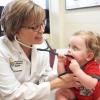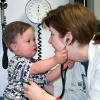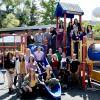Our program in Iowa first began in 1948 as a small, 20-bed residential service on the University of Iowa health sciences campus for "educable" children with disabilities. From there, the Division of Developmental-Behavioral Pediatrics has grown to Iowa's premier health resource for people with disabilities of all ages and their families.
Last year, almost 10,000 outpatient visits were made in our interdisciplinary outpatient clinics, where we evaluate and treat patients with autism, myelodysplasia, Down syndrome, cerebral palsy, Prader Willi Syndrome, feeding disorders, brain injury, developmental delay, learning disorders, ADHD, and behavior problems.
Services are provided through the Center for Disabilities and Development (CDD), which is a nationally respected stand-alone facility on the campus of University of Iowa Hospitals & Clinics. As an interdisciplinary center of excellence, it integrates a broad range of clinical services in one location, including developmental and behavioral pediatrics, psychology and neuropsychology, speech-language pathology, occupational and physical therapy, social work, education, audiology, and nursing, and thus provides an environment for exceptional patient care, education, and research.
CDD is recognized as Iowa's University Center for Excellence in Developmental Disabilities (UCEDD), which works to ensure that all Iowans with disabilities have the opportunities, services, and supports they need to be independent and productive members of their home communities.
The division offers a three-year fellowship program that consists of clinical, research, and community-based experiences. Fellows are involved in supervised research and clinical activities which include a dedicated DBP continuity clinic throughout the three-year program, and rotations in pediatric psychology, child neurology, child and adolescent psychiatry, medical genetics, orthopedics, physical and occupational therapy, speech language therapy, behavior therapy, as well as other programs. Fellows will have the opportunity to be mentored by NIH-funded DBP and psychology faculty who are passionate about clinical research and training. Research in the division includes a focus on prevention of developmental and behavioral problems in early childhood by examining early parent-child attachment patterns and how a parent's brain responds to seeing and hearing their infant during functional brain scanning. Fellows typically spend 24 months in clinical training and 12 months in research.
For one year of the fellowship, trainees participate in the Leadership Education in Neurodevelopmental and Related Disabilities (LEND) program, which provides outstanding interdisciplinary training in neurodevelopmental disabilities, policy and advocacy, and community living.
Another goal is to better understand how genetics and the social environment intersect to predict developmental outcomes in childhood. The Division has been a national leader in research using applied behavior analysis to treat severe and challenging behavior. Recent studies have demonstrated practical strategies for using telehealth to expand access to behavioral treatment for children in rural and underserved areas.



